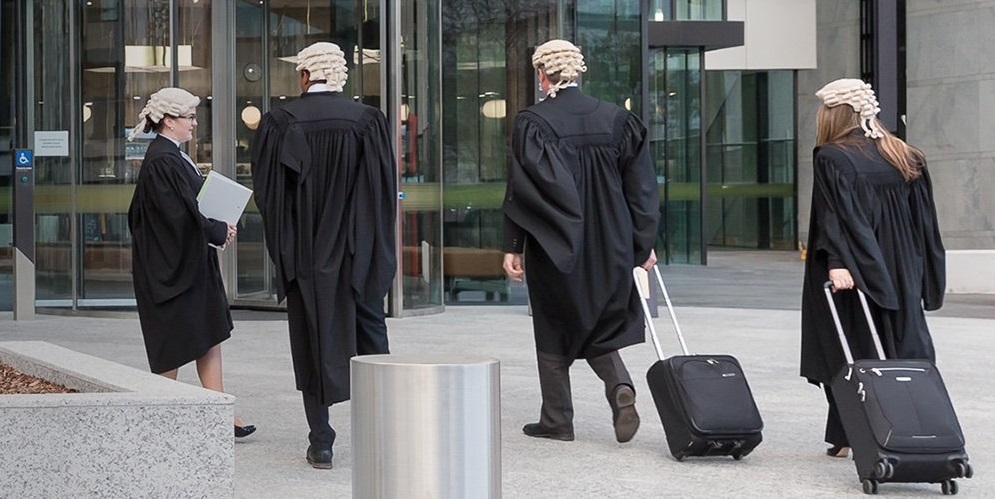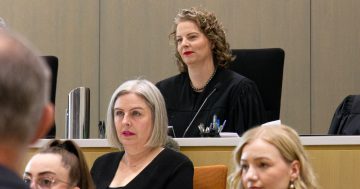
ACT Bar Association president Marcus Hassall has called on the government to place the Legal Aid Commission on ‘viable financial footing’ to provide services. Photo: ACT Bar Association Twitter.
The ACT Bar Association has called on the government to provide more “regularisation” of funding for the Legal Aid Commission to ensure certainty it can continue its services for those who can’t afford legal representation.
President Marcus Hassall issued the plea off the back of the 2023 National Legal Aid Report, which found that for every $1 of Commonwealth money directed to relevant Legal Aid services, there was an estimated $2.25 return.
This return was delivered in the form of improved operational capacity of the courts, value to individuals and wider government, and societal outcomes, such as reduced domestic and family violence.
Mr Hassall said the benefits found were “unsurprising”.
“Lawyers know that the work that Legal Aid Commissions perform in the family law space ‘adds value’ to justice outcomes and society at large in both a financial and non-financial sense,” he said.
“It is critical to the continuation of those outcomes that the ACT Government place the Legal Aid Commission [LAC] on a viable financial footing so that it can provide services in the criminal law sphere from which the entire community benefits.”
The ACT LAC works in partnership with private legal practitioners, both solicitors and barristers, to represent vulnerable and disadvantaged members of the community facing the Territory’s courts or tribunals.
CEO Dr John Boersig said it also briefed barristers for some of the work in higher courts, as well as making grants of legal assistance to clients where they’re represented by private legal practitioners on a “fee for service” arrangement.
“Annually this outsourced work to private legal practitioners is between $2.5 and $3 million,” he said.
Mr Hassall said a “significant chunk” of the LAC’s annual funding came from a variable amount paid from the statutory interest account (SIA) administered by the ACT Law Society.
This takes the form of a grant based on the interest generated on trust funds held by the account.
Dr Boersig said funding from the SIA contributed to the payment of the LAC’s services.
“The LAC is funded by the Territory and Commonwealth governments, and through the Law Society’s SIA, to provide legal aid services,” he said.
“As there is always a shortfall [in government funding] it must come from LAC consolidated funds.”
The issue lies in how unreliable the money from the SIA can be.
Each year, the amount deposited varies and fluctuating interest rates also have an impact on how much money is available.
In the 2019-20 financial year, the LAC’s total funding was $16.724 million, with $1.345 million (or 8 per cent) coming from the SIA.
The money received declined to just over $300,000 in the 2021-22 financial year.
However, it’s understood the amount received from the SIA for the 2022-23 financial year was $0.
Mr Hassall said it was this uncertainty that needed addressing.
“It’s difficult to see how any organisation can be run with that degree of unpredictability as part of its core funding,” he said.
“The Bar Association is seeking from the ACT Government a greater regularisation of the core funding of the Legal Aid Commission so as to enable it to manage its financial affairs more effectively and efficiently.
“This refers not just to the amount received from the statutory interest account but also the increasing phenomenon of funding which is both temporary and tied to specific purposes or programs, thereby increasing administration expenses of the Commission and making it more difficult for the Commission to engage in advance financial planning.”
Mr Hassall pointed out there had been no increase in the scale of fees payable by the LAC to private lawyers appearing in legal aid matters in the past decade.
The ACT Government did provide the LAC with two years of shortfall funding of $750,000 per year ($1.5 million in total) in the 2021-22 Budget in light of the fall in SIA funds.
Attorney-General Shane Rattenbury said the government was “committed” to ensuring Legal Aid had adequate funds to continue its services, and was prepared to step in to help the commission meet its needs when shortfalls occurred.
“Like all agencies, Legal Aid is considered in the budget process each year – this is what happened in the situation of Legal Aid’s statutory interest shortfall,” he said.
“Had the statutory interest shortfall not been addressed, Legal Aid estimates it may have had to refuse around 300 grants of assistance per year and, potentially, lost staff.”
This shortfall funding will end on 30 June.
“It is understood that funding from the statutory interest account going forward will return to pre-Covid levels,” Mr Rattenbury said.
Legal Aid has received new government funding of $8.2 million over the past three Budgets.















